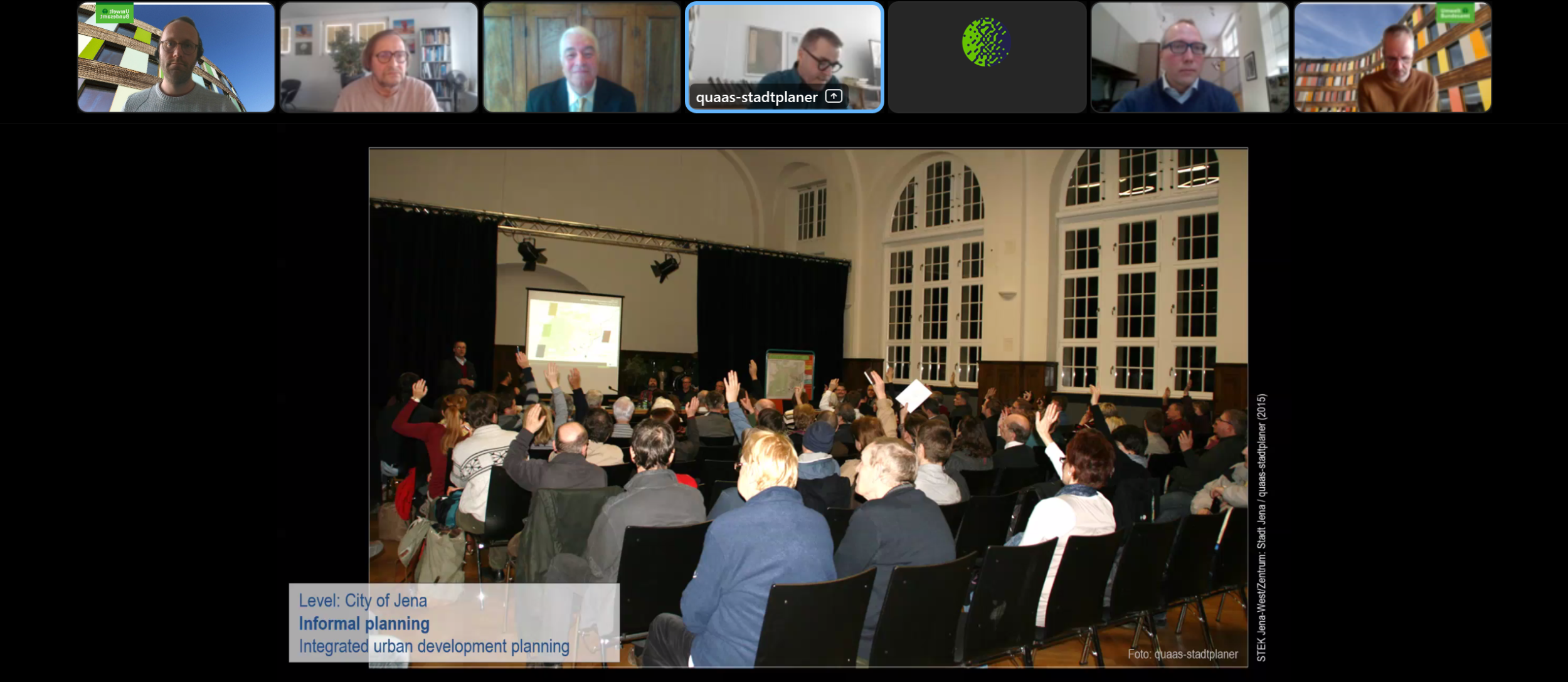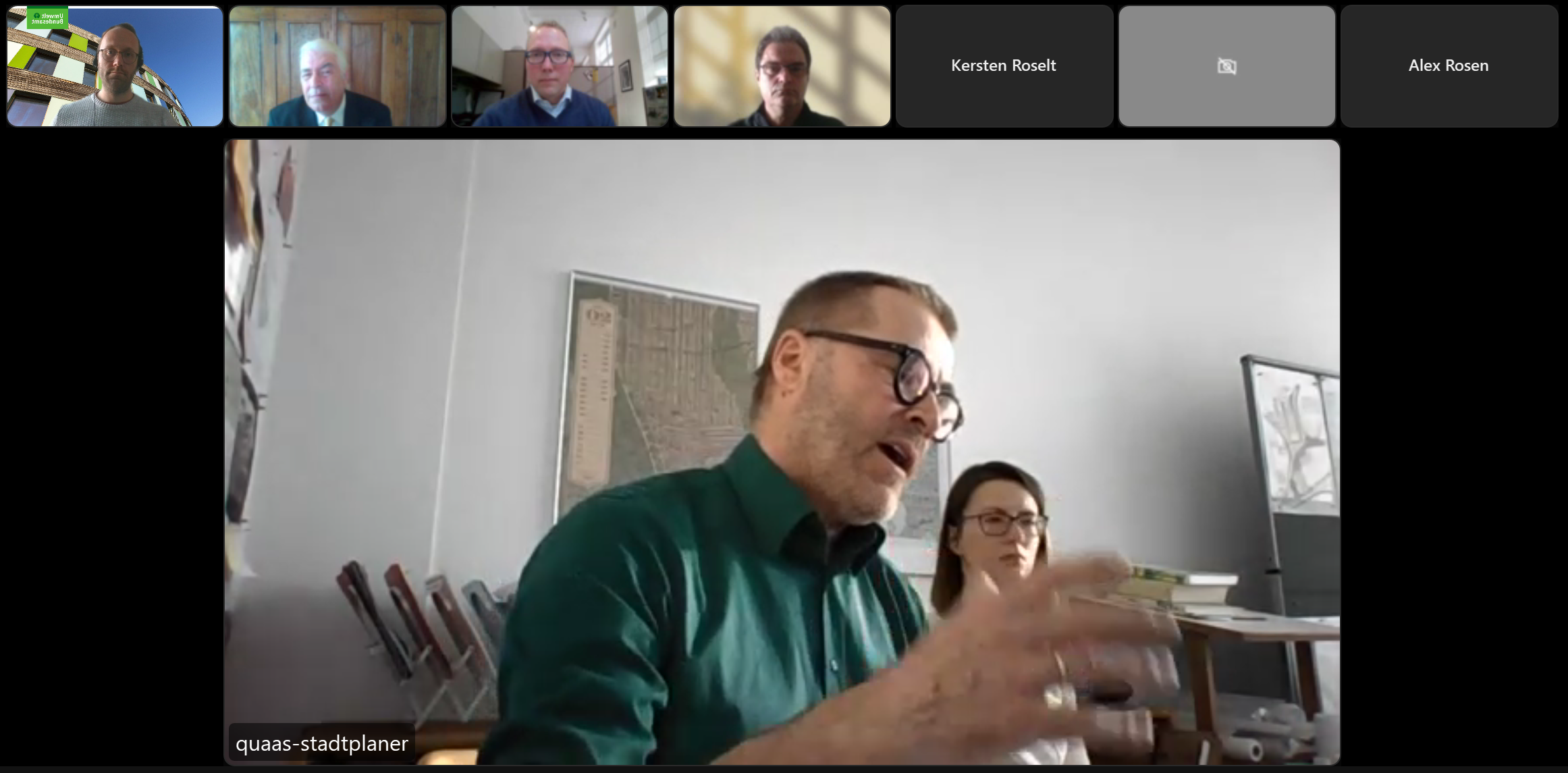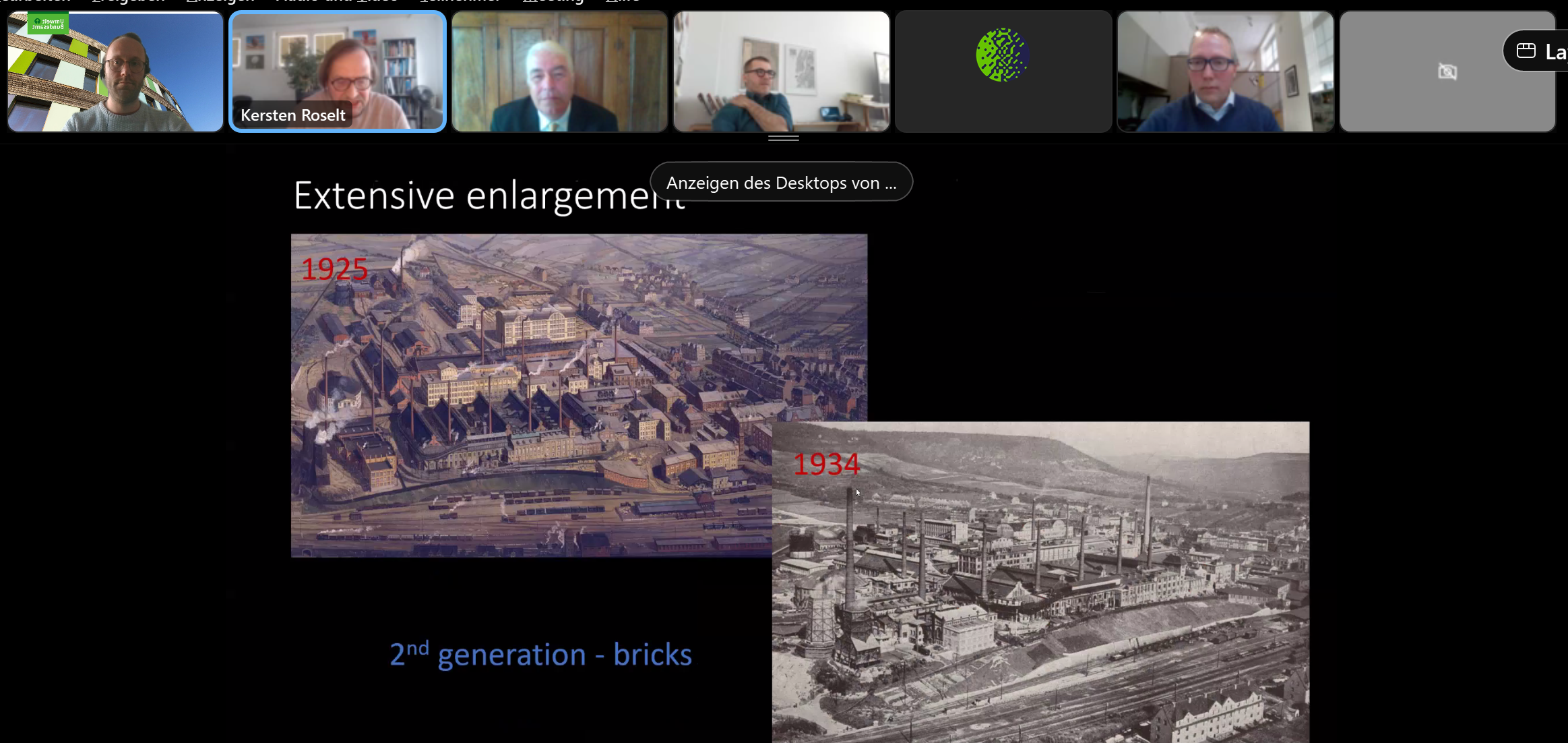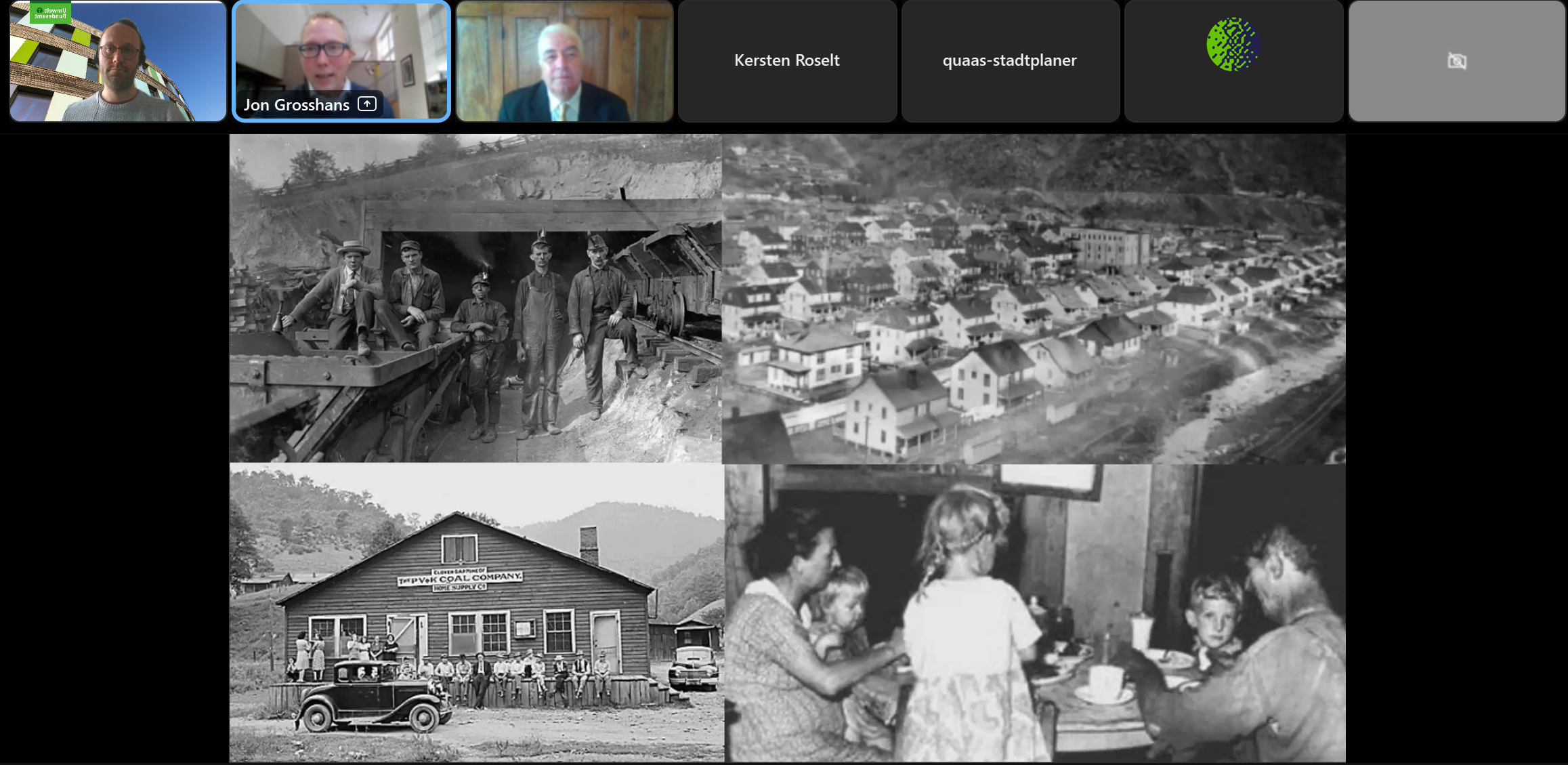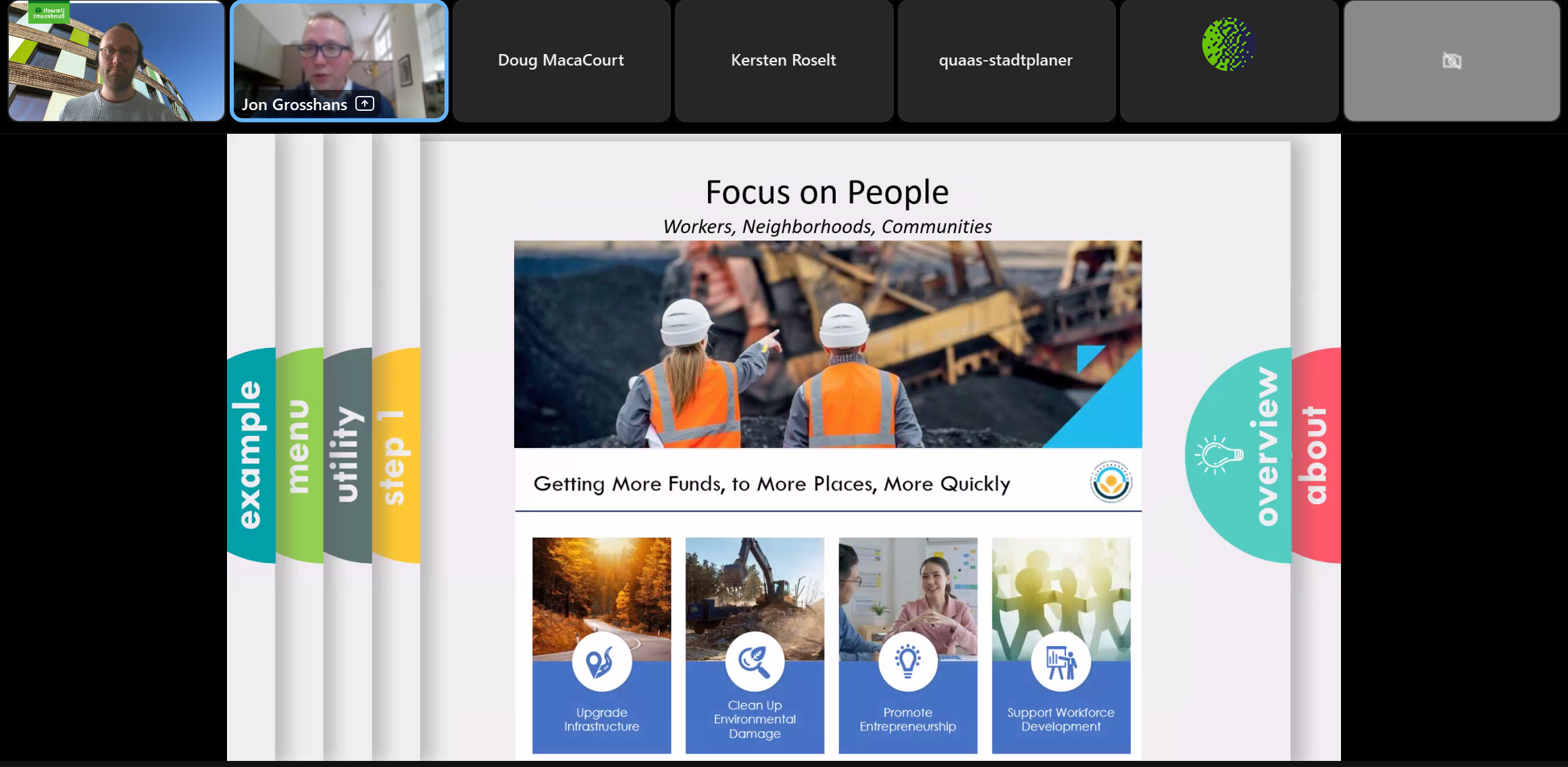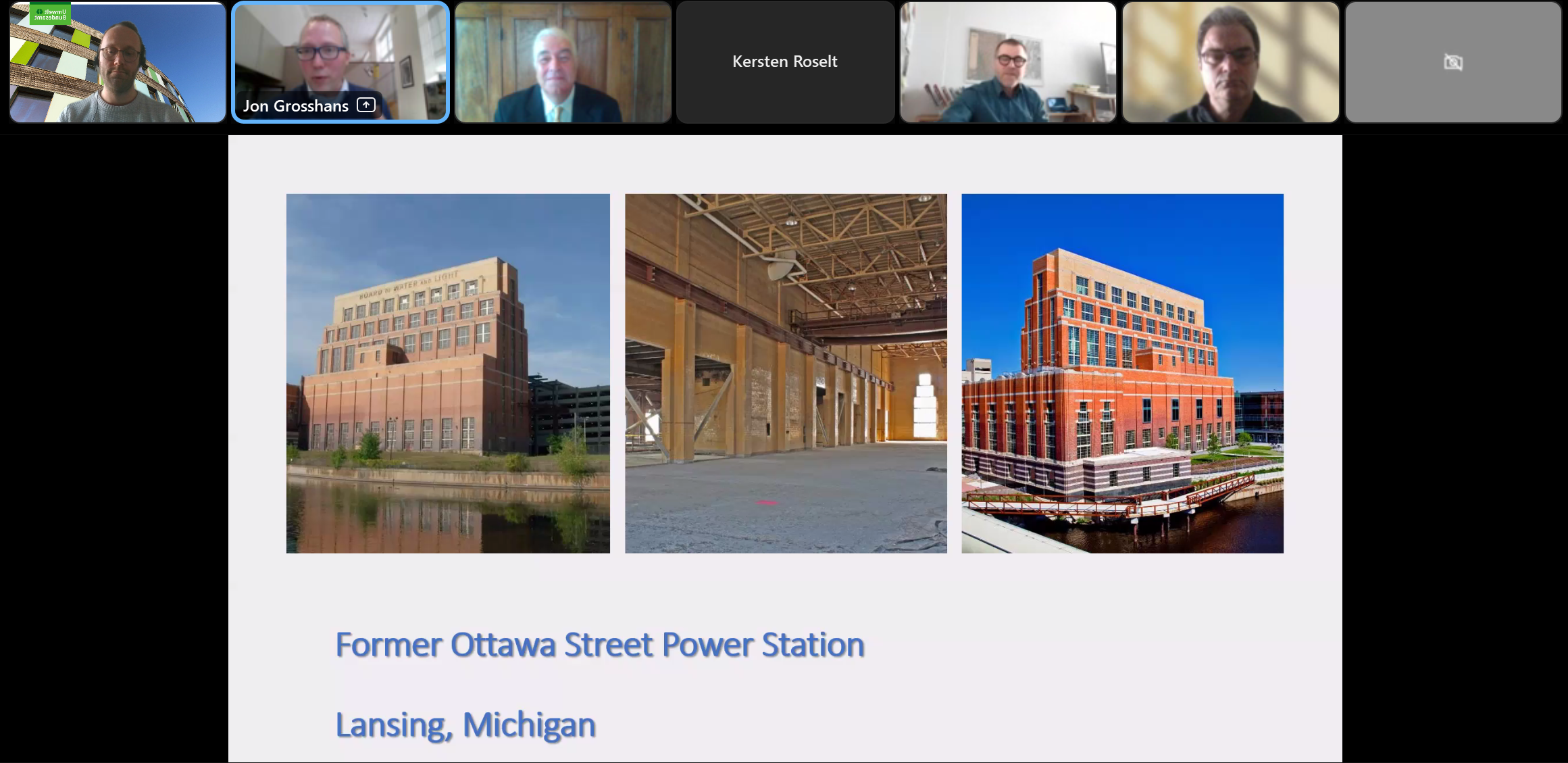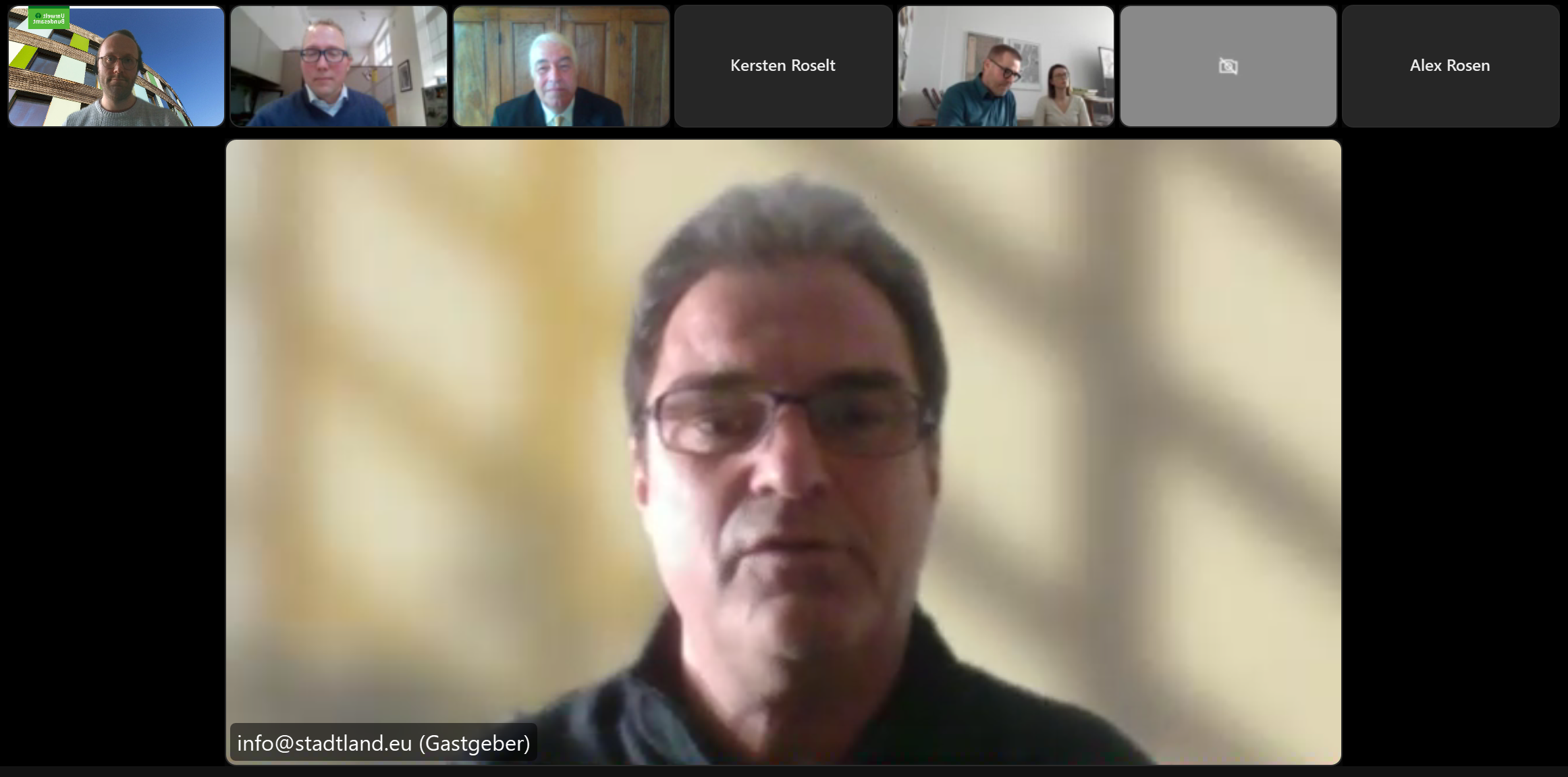April 19th, 2023 from 16:00-17:30 CET
DE-US.net Webinar "Multi-Level Agencies"
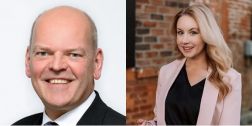
Modifying as well as providing new programs which consider area wide planning can better support the needs of a broader society, from urban to rural needs. Philanthropic organizations and professional associations also play an important role. With this webinar we will highlight experiences on brownfield redevelopment projects from both the German and US context with a focus on the role of agencies and their programming.
An example of a German approach to this position was shown by:
- Dr. Roland Arnz (Managing Director of AAV - Verband für Flächenrecycling und Altlastensanierung)
The US perspective was shared by:
- Olivia Hough (Regulatory Strategist for City Utilities of Springfield Missouri, MO)
Moderating the discussion was Uwe Ferber (StadtLand GmbH) and Sabine Martin (Kansas State University)
June 9th, 2022 from 16:00-17:30 CET
DE-US.net Webinar "Community Engagement"
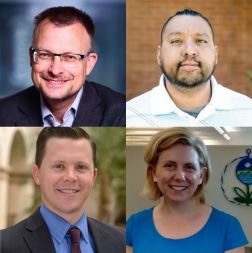
The use of land resources in is prone to various social, economic and environmental interests. Key for navigating this situation is direct interaction with residents and neighborhoods. How is this done in Germany and the USA? By holistically considering strategic planning on the one hand and community needs on the other, key strategic partnerships in the City of Leipzig and the City of Fresno (CA) have created a number of successful projects. The examples show that redevelopment planning should be a proactive, co-creative process involving the local communities, small businesses, and other stakeholders as early possible.
An example of a German approach to this position was shown by:
- Stefan Heinig (freelance planner)
Members of the Fresno City Council and community who spoke about their experience were:
- Drew Wilson (City Council of Fresno)
- German Quinonez (Every Neighborhood Partnership)
The ensuing discussion was moderated by Aimee Storm (USEPA) and Karl Eckert (UBA).
May 12th, 2022 from 16:00-17:30 CET
DE-US.net Webinar "Area Wide Planning"
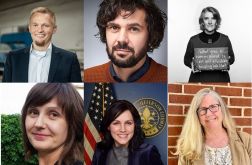
This webinar showcases existing tools and their use to improve the area wide planning perspective. Viable information on land use including previously developed vacant sites and brownfield land plots should be readily available and accessible for relevant stakeholders in communities and across municipal borders. The evaluation of these site’s potential contribution to equitable development and climate protection adaptation will be discussed as part of new planning priorities.
Joining from the German side were:
- Raphael Thießen (Brownfield24)
- Dr. Robert Hecht (Leibniz Institute for Ecological Urban and Regional Development)
The US perspective was detailed out by inputs from:
- Dr. Lauren C. Heberle (Associate Professor of Sociology, Director of the Center for Environmental Policy and Management, University of Louisville)
- Dr. Allison Smith (Assistant Director of the Office of Advanced Planning and Sustainability, Louisville Metro Government)
- Councilmember Nicole George (Chair, Jefferson Council Metro Council Public Works Committee)
The ensuing discussion was moderated by Ann Caroll (USEPA).
April 28th, 2022 from 16:00-18:00 CET
DE-US.net Webinar "Tradable Development Rights"
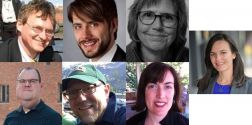
The consumption of open spaces for settlement and transport use results in urban sprawl, land and soil sealing, more traffic, higher costs for infrastructure, loss of biodiversity, among many other detrimental effects. Germany has a political target to reduce such land consumption to less than 30 hectares per day (roughly 75 acres per day) by the year 2030. The US, on the other hand, does not have such a target in place. Nevertheless, in parts of the country there is an increasing sensitivity concerning the conversion of agricultural or forest land into settlement structures. In order to control land consumption and protect open spaces, both countries have tested market-based tools based on development rights and certificates to develop land.
The webinar aims at exchanging international experiences with both approaches and jointly discussing the pros and cons.
The German perspective was described by speakers such as Detlef Grimski (German Environmental Agency), Renate Daurer (City of Esslingen am Neckar) and Björn Fleischer (Ministry of Economic Affairs, Innovation, Digitalization and Energy NRW). Joining from the US was Michael Murphy (King County Department of Natural Resources and Parks), Nick Bratton (Forterra) and Erika Harris (Puget Sound Regional Council).
The ensuing discussion was moderated by Sarah Seilhof (Maul Foster & Alongi, Inc.).
Webinar Recording
March 24th, 2022 from 16:00-17:30 CET
DE-US.net Webinar "Sustainable Reuse"
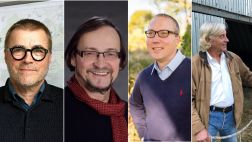
Land use, especially in urban-rural regions, is dynamic; municipalities need to adapt to changing societal needs and opportunities (for jobs, health, living standards, logistics, etc.). Further, municipalities are challenged to provide resiliency against environmental stresses caused by climate change. For this, both private and public perspectives are important to consider.
During the webinar, speakers such as Kersten Roselt (Jena GEOS) & Ingo Quaas (quaas stadtplaner) from the German side as well as Jon Grosshans (USEPA) from the United States presented best practice examples for dealing with the restructuring of industrial areas in Thuringia (as exemplified with the Zeiss industrial site in Jena) as well as the Appalachia Just Transition program in the eastern US.
The discussion with participates was moderated by Doug MacCourt and Uwe Ferber (StadtLand GmbH).
Webinar Recording
The webinar was on July 1st at 14:00-15:00 GMT
DE-US.net Webinar "Smart Cities - Beyond Technology"
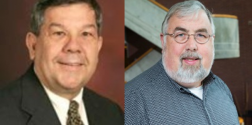
This webinar seeks to expand the Smart Cities conversation from its current focus on smart technologies and IoT to cities as Smart socio-ecological systems that continuously increase their performance, interconnected behaviors, biocapacity, resilience, regeneration and ability to thrive.
Our speakers are Professors John Motloch and Scott Truex.
The webinar was on June 6th at 14:00-15:15 GMT
DE-US.net Webinar Redevelopment Assistance to Brownfields Communities in the US and Germany
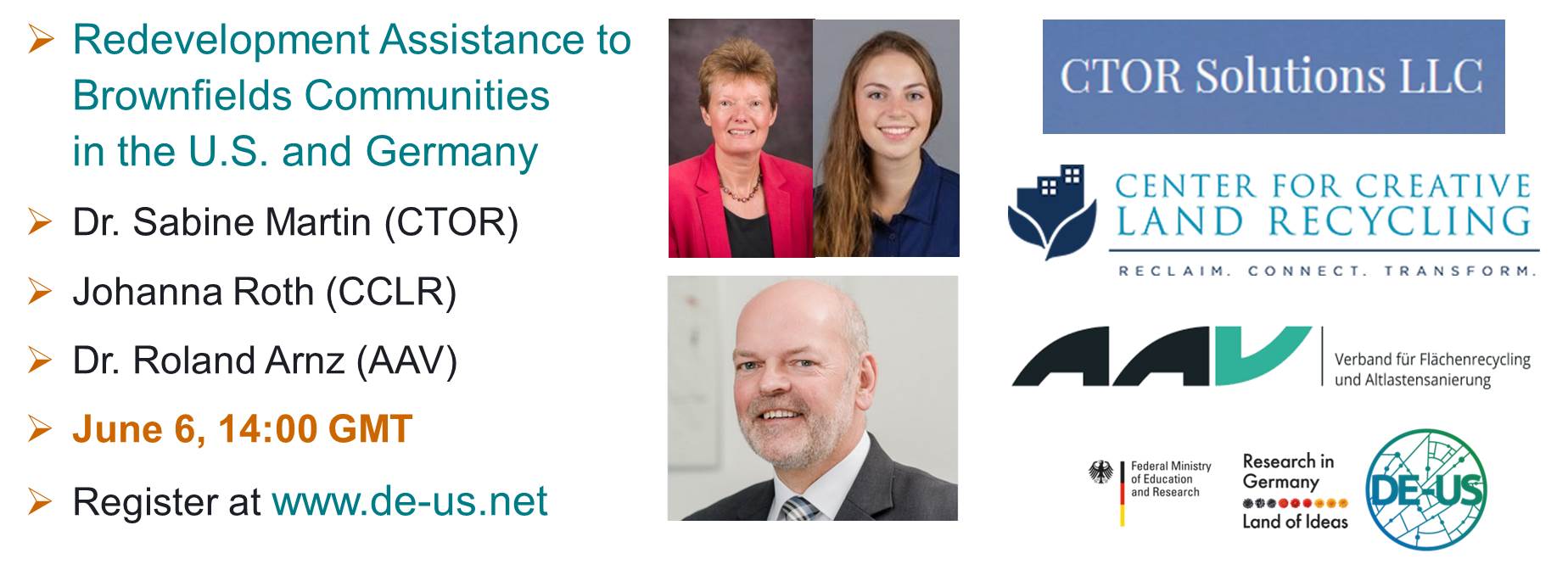
Brownfields are an issue both in the US and in Germany. During this webinar, speakers will provide an overview of available and free redevelopment assistance to communities dealing with brownfield issues in both countries.
Particularly for the U.S., Dr. Sabine Martin, president of CTOR Solutions, and Johanna Roth, Center for Creative Land Recycling - CCLR, will introduce the national Technical Assistance to Brownfield Communities (TAB) program assistance to support brownfield redevelopment - highlighting available brownfield related EPA resources and state specific resource examples.
For Germany, Dr. Roland Arnz, AAV – Association for Land Recycling and Remediation, introduces how AAV supports brownfield recycling in the Federal State of North-Rhine-Westphalia, which is the most populated German state and has been the industrial heart of Germany’s heavy industries.
The webinar was on Feb. 7th at 15:00- 16:00 GMT (16:00 - 16:45 Berlin | 10:00 am - 11:00 am Washington).
Assessing Transatlantic Exchange on Urban Revitalization - What works, what doesn’t? – Shaping future programming
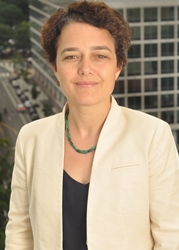
The regeneration of older industrial cities remains a challenge for U.S. and European countries. Although the legal, policy, political and community contexts are different, researcher and policymakers in European and US cities have long compared approaches to urban regeneration with an eye toward replicating successful programs and policies. In fact, non-governmental organizations, universities, governments, foundations, and private initiatives have sponsored, convened, and supported dozens of transatlantic professional exchanges among peer policymakers, practitioners, researchers, and civic/business leaders.
To better understand the impact of such transatlantic exchanges, the Urban Institute in Washington, DC – in partnership with the Lincoln Institute of Land Policy – is currently developing a typology and high-level assessment of peer-learning activities that have taken place over the past decade with a specific focus on the revitalization of older, industrial cities in Europe and the United States.
This webinar took the form of an interactive discussion. Participants were asked to contribute their experience and perspectives. Specifically, participants were invited to discuss two broad questions: (1) Describe a peer learning experience you participated in that was particularly successful; and (2) Describe any concrete outcomes, including changes in program or policy, that have resulted from peer learning activities in which you participated. The input was used to identify needs and priorities and to shape future programming and support. Moreover, the webinar provides initial findings, including an overview of different exchange formats.
The discussion was be led by Tamar Shapiro, a non-resident fellow with the Urban Institute, currently based in Leipzig, Germany. Before moving to Leipzig, Tamar was the President and CEO of the Center for Community Progress, a national non-profit working on vacant property revitalization in the United States. Prior to that, she ran the Urban Policy Program at the German Marshall Fund of the United States.
The webinar was on Dec. 20th at 14:30 - 15:45 GMT.
Global Warming: What can we learn from the COP24 meeting?
Download
Summerschool Bochum
May 2018, Bochum
The rediscovery of urban open spaces to be climate ready and liveable
This webinar was on Monday, 26 March 2018, 17:00 Europe/Berlin
Climate resilient investment finance after the Bonn-Fiji Commitment to urban action
This webinar was on Thursday, February 22, 2018, 16:00 Europe/Berlin
Due to legislators’ short terms of office, the public sector tends to focus on immediate needs, rather than longer-term investment. As a result, generating commitments to infrastructure investments is always difficult. Anticipating and responding to political and economic threats to infrastructure from climate change is even more challenging. Investments in resilient infrastructure can both mitigate climate risks and improve adaptive capacity. After one of the warmest calendar years on record, the DE-US webinar series returns to the issue of attracting needed investments. We shall briefly review the general infrastructure finance problem and existing tools for raising funds. Then we shall turn to the 2017 Bonn-Fiji commitment of Local and Regional Leaders to the Paris Accord and the new opportunities those commitments provide as well as the demands for finance they encompass. We then will examine major emissions trading schemes in place and in development, notably in China. Looking at the divergent characteristics of market prices and the social costs of carbon, we will close by considering the features of carbon trading systems that would best support raising climate-resilient infrastructure funds while reducing emissions and raising awareness of the local development co-benefits of low carbon, climate-resilient strategies of cities.
Brownfields 2017: Review & Preview // Brownfields Redevelopment, The Opel/GM Case in Bochum/Germany
This webinar was on Monday, January 23, 2018, 16:00 Europe/Berlin
Redevelopment of brownfields, former coal minig and steel production sites, is in the Ruhr-Region of Germany daily business since 1958. But the redevelopment in the second generation (The Opel site was former coal mining area Dannenbaum) is very special : a new company with the fomer landlord as shareholder, very short development time, integration in the city redevelopment are highlights. Can the case OPEL/GM in Bochum also best practise for USA, special for Detroit ? That could be a good issue to discuss.
2. Webinar: Optimization of redevelopment for environmentally burdened sites
This webinar was on Monday, November 27, 2017, 16:00 Europe/Berlin
The authors Ingo Quaas and Kersten Roselt developed with their teams a method to optimize the redevelopment of contaminated, derelict properties. The approach is based on identification and monetary valuation of liability risks and waste disposal uncertainties. Application of this method - called optirisk® - is a significant contribution to an INTEGRATED SITE REDEVELOPMENT CONCEPT, which reduces investment needs to an optimal level facing the site-specifc risk. Thus, the chances of reactivating polluted sites are improved. Moreover, optirisk® also allows to consider the options of using renewable energies in relation with the re-use of a site. The webinar will introduce the concept and report about aplications in the US and Germany.
More Information in English and German at http://www.optirisk.de
Climate-Resilient Infrastructure Financing - A Webinar
This webinar was on Wednesday, September 13, 2017, 17:00 Europe/Berlin
Infrastructure financing is a perennial problem: the public sector tends to focus on immediate needs, rather than longer-term investment. But infrastructure investments can both mitigate climate risks and improve adaptive capacity. Climate infrastructure finance is thus the first webinar topic in the DE-US series. We shall examine the general infrastructure finance problem, existing tools for raising funds and the special conditions and opportunities that the logic and process of the Paris Accord provides. In particular, we will review major emissions trading schemes and their prospects for raising climate infrastructure funds while reducing emissions and raising awareness of the costs of burning carbon.


